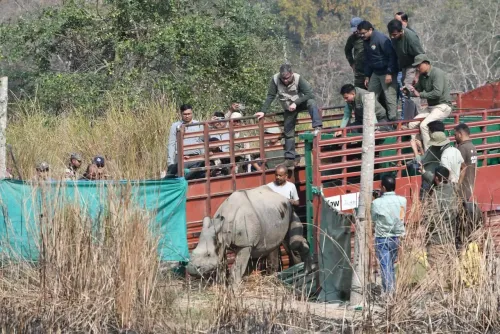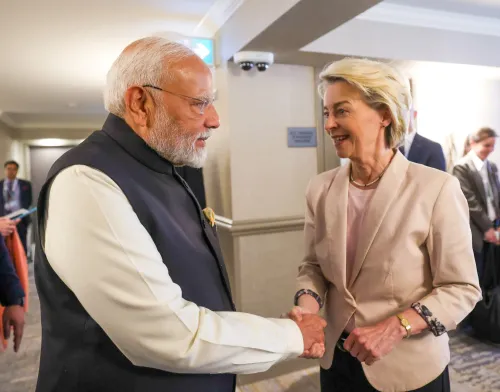Will the Entire Pulse Produce be Procured on MSP? Union Minister Chouhan's Assurance to Punjab Farmers

Synopsis
Key Takeaways
- Assured MSP: Union Minister Chouhan guarantees MSP for pulses.
- Eco-Friendly Practices: Ransingh Kalan serves as a model for sustainable farming.
- Community Involvement: Active participation is essential for agricultural success.
- Income Growth: Diversifying crops can enhance farmers' income.
- Environmental Benefits: Sustainable agriculture can reduce pollution and protect soil health.
Moga (Punjab), Nov 27 (NationPress) In a strong commitment to farmers, Union Agriculture Minister Shivraj Singh Chouhan assured that the complete yield of pulses including tur, urad, lentils, and gram will be purchased at the minimum support price (MSP). On Thursday, he praised the Ransingh Kalan panchayat in Punjab's district for their efforts in preventing stubble burning, managing crop residue, reducing chemical fertiliser usage, and adopting water-efficient farming practices.
Referring to it as a beacon of hope for the entire nation, Union Minister Chouhan noted that pollution levels in the national capital are on the rise, with air quality reaching alarming levels.
He remarked, "The smoke from stubble burning is a significant factor contributing to pollution in northern India. In this light, the non-stubble burning initiative in Ransingh Kalan is viewed as a constructive force for change," during his visit to the village, where he was warmly received by local residents.
At the home of the sarpanch, the Union Minister took a seat on a traditional charpai and relished a traditional Punjabi meal that included sarson da saag, makki di roti, and a glass of lassi.
During discussions on stubble management, Chouhan highlighted that stubble burning is a nationwide issue as it endangers beneficial insects and leads to severe air pollution.
He noted that this year's stubble burning incidents in Punjab have significantly decreased, with villages like Ransingh Kalan demonstrating that scientific management allows farmers to prepare fields for the next crop without resorting to burning.
Union Minister Chouhan mentioned that farmers in Ransingh Kalan have refrained from stubble burning for six consecutive years, opting instead for methods like direct seeding and happy seeding, which incorporate crop residue back into the soil.
"This practice enhances soil carbon and organic matter, reduces the reliance on chemical fertilisers, and does not adversely affect production," he explained.
He commended sarpanch Preet Inderpal Singh and the entire village, stating that this community serves as a model to other regions still engaged in stubble burning, showing that utilizing residue as fertiliser and mulch can yield significant benefits while conserving water, diesel, and fertiliser.
Standing alongside farmer Gopal Singh, the Union Minister evaluated the direct-seeded wheat crop and clarified the scientific principles of germination, crown root development, and irrigation requirements in layman's terms.
He assured that no additional irrigation was necessary in the crop's early stages until the crown root matured, stating that the crop remained robust even after a month without irrigation, leading to substantial savings in water and diesel.
Furthermore, he pointed out that farmers are now using less diammonium phosphate (DAP) and urea than before, and there is no concern about reduced production, as mulching stubble suppresses weeds, retains soil moisture, and protects beneficial organisms.
During the dialogue, Chouhan emphasized that mixing stubble into the soil rather than burning it creates natural mulching, which helps regulate soil temperature, conserve moisture, and reduce weed growth.
"This practice lowers farmers' expenses on weeding, irrigation, and chemical fertilisers, while enhancing soil organic carbon levels and stabilising yields," he added.
As he concluded his two-day state visit, the Union Minister stated that the Punjab experiment clearly illustrates that environmental protection and increased farmer income can coexist when scientific methods are diligently applied at the farm level, with active community involvement.
He referenced suggestions from locals, including farmer Gurpreet, mentioning that cultivating oilseed crops like mustard could enable farmers to boost their income while helping the nation reduce its reliance on imported edible oils.
Chouhan pointed out that the nation still imports significant quantities of edible oil, draining valuable foreign currency.
"However, if oilseeds are cultivated as part of agriculture, domestic production can meet national demands," he affirmed.
Offering a strong guarantee to farmers, Union Minister Chouhan stated that it is a valid expectation for farmers to increase the output of tur, urad, lentils, and gram pulses provided they receive fair prices.
"Therefore, the government will ensure MSP purchases for these crops," he stated.
He added that enhanced pulse production will bolster the country’s protein security, stabilise pulse prices, and lessen dependency on imports, benefiting both farmers and consumers.
Punjab BJP President Sunil Jakhar, who accompanied Union Minister Chouhan, acknowledged that stubble burning poses a legitimate concern for farmers, but practical and farmer-centric solutions could transform the challenge into an economic opportunity.
He advocated for ongoing engagement with the farming community to devise long-term solutions.










